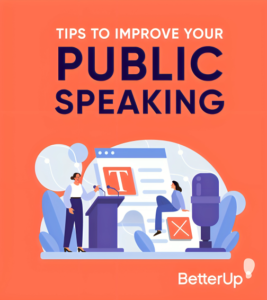Tips for Improving Public Speaking Skills are essential because public speaking is one of the most important professional skills, used in nearly every industry. However, it is also one that people commonly fear. The good news is, speaking confidently and effectively in front of a group is a skill that anybody can master.
Whether you’re presenting findings to your team or explaining complex ideas to potential investors, you can improve your public speaking skills with a little practice. Here are 10 tips for improving your public speaking skills that you can start practicing today.
10 Tips for Improving Public Speaking Skills

Know your audience
You’re more likely to feel comfortable presenting to an audience if you know who they are. That way, you can craft your message in a tone that resonates with them, perhaps using humor to ease the tension.
Start by assessing your audience’s level of understanding of the topic you plan to discuss. This will determine the amount of background to give and whether you should aim to be more professional or casual.
As you’re speaking, stay aware of the group’s reactions. Adjust accordingly so you can connect with them throughout your presentation.
Practice, practice, practice
Even the most seasoned public speaker needs practice to be effective. Give a mock presentation of your speech in advance so you can determine if you’ve organized the information cohesively and clearly.
It may help to talk out loud to an imaginary audience or in front of a mirror, but it’s even more effective to practice with the help of a supportive co-worker, friend, or family member as an audience.
Use feedback to your advantage
Whether you’re practicing or giving a presentation, ask for feedback. This constructive criticism could include specific examples that you can use to improve for future presentations.
If your friends point out that you say “umm” or “you know” too much, make sure that you’re not taking the feedback personally. Integrate their comments into future presentations and thank your friend or team for giving you invaluable feedback.
Make it your own
Connecting with an audience can be easier when you add your own personality or flair. Let your personality shine through as you convey your message, whether you are a naturally funny or empathetic person. Be authentic and appropriate—use humor when it can enhance your work, rather than detract from it.
If you use a PowerPoint presentation while speaking, make sure you’re not reading from it word for word but using images or videos to bring your presentation to life. You may want to add your contact information at the end of the presentation so people can follow up with you afterward.
Connect with a personal story
Personal stories or anecdotes can enhance your presentation. When TED Talk speakers take the stage, they often begin with a short anecdote about their childhood or personal experience. This structure helps them connect with the audience, share their passion for what they’re about to discuss, or explain their expertise.
To add this kind of personal touch to your presentation, make sure what you share has a direct connection with the topic at hand.
Make eye contact
Making eye contact with your audience can actually help you feel more at ease because you’ll get a sense of whether they understand what you’re saying or need to clarify further. Practicing your speech or presentation beforehand can help you feel more comfortable making eye contact.
As they say, much of effective communication relies on body language. Moving your gaze around the room can help your audience feel more engaged, which in turn will make you feel more confident.
Use the stage to your advantage
Before the presentation, know where you’ll be speaking. Check that your PowerPoint presentation works with the provided equipment. Make sure you know how the room will be set up. Ask about time constraints, whether people will be eating during your talk, and what kind of microphone you’ll be using.
When you’re on stage, own the space. Walk to different areas to make eye contact with other people in the audience. Be aware of your body language. Let your arms hang loosely. Stand with excellent posture, with your back straight. Smile.
Calm your nerves
It’s normal to still find yourself overcome with nerves at some point in your presentation, despite your preparation. When this happens, take a deep breath. No one’s expecting you to be perfect.
Instead of thrusting your hands in your pockets or playing with your hair, think of ways to cope with your nerves beforehand. You might make sure to exercise that morning or meditate for five minutes before speaking.
Record yourself speaking
Co-workers and friends can help provide feedback, but you can also evaluate yourself while speaking. When you speak in front of a group, set up your phone to record yourself and watch it later. You may be surprised by your nervous habits or awkward phrasing. You might find new ways to improve the readability of your PowerPoint slides.
If you’re giving a presentation on Zoom, ask your audience if you can record the meeting. Use this technology to improve your skills to be even more effective next time and avoid ruminating on mistakes. Stay positive.
Make a lasting impression with a strong conclusion
Just as experts encourage speakers to grab their audience’s attention within the first 30 seconds of their presentations, it’s also wise to create a solid ending to any presentation. This closing can include things like:
- A call to action that encourages listeners to take the next step.
- A memorable quote that inspires or illustrates a point from your presentation.
- A personal story that demonstrates why this issue is so important to you.
- A summary of the most important takeaways.
Remember to thank the audience for their time once you conclude your presentation. If there is time, you can invite questions and answer them from the stage or prompt them to follow up with you afterward.
The Importance of Developing Your Public Speaking Skills
Public speaking skills are helpful for growth in your career but also in everyday life. Here’s how developing strong public speaking skills can benefit you:
- Strengthen team-building and collaboration.
- Share your ideas and offer solutions to work-related problems.
- Earn esteem with employers and co-workers alike.
- Create connections that can lead to new professional opportunities.
The benefits of these skills transfer easily to other areas of your life. You can improve your relationships along with your professional success by developing clear and effective communication.
It can take time to improve public speaking skills. The key to confidence is a willingness to embrace the temporary feeling of discomfort that comes with developing any new skill.
Next Steps for Success
Apply these tips for improving public speaking skills to improve your ability to confidently execute a presentation. Further refine your skills by practicing and learning from those who can demonstrate their success in public speaking.
Join a public speaking support group
Toastmasters International, a nonprofit organization with chapters throughout the world, empowers people to develop their public speaking and leadership skills in a supportive group setting. Members practice giving speeches and overcoming shyness and anxiety with regular online and in-person meetings.
Attend public speaking events
If your town or city offers events with speakers on various topics, consider these opportunities to learn. When watching others give presentations, use a critical eye to learn what works and what doesn’t. Ask yourself why you enjoyed or didn’t enjoy the lecture, based on their tone, expressions, and body language. If you’re looking for expert guidance to improve your own speaking skills, you might want to consult the best speech therapist in Islamabad.
Watch videos of effective public speaking
Finally, you can enjoy the same learning experience of in-person lectures by watching videos of influential public speakers. TED Talks is an online collection of presentations on a wide range of topics, including science, entertainment, and business. Watch as many as you can and use the best speakers as mentors to improve your confidence and success in public speaking.
Take public speaking classes
Online public speaking courses provide opportunities to learn ways to improve communication skills from the comfort of your home or office. Take the Introduction to Public Speaking course or Dynamic Public Speaking Specialization offered by the University of Washington to gain confidence as you learn presentation and public speaking skills.


